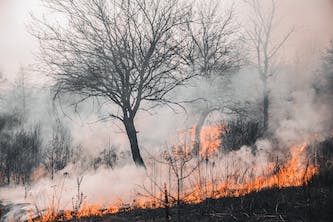Big blue whales are back in a part of the ocean near India. They were gone because people hunted too many of them a long time ago. Now, people have seen the whales again in 2020 and 2021. This is good news because blue whales are still in danger of disappearing, and there are not many of them left.
People listened under the water and found out that blue whales stay in this ocean area for many months. They think the whales might have babies there. A long time ago, people killed lots of blue whales, but now they have a chance to grow in numbers again. The ocean near the Seychelles islands is quiet and safe, which is good for the whales.
Scientists want to keep the blue whales safe and learn more about them. The Seychelles has made a big part of its ocean a protected area. This means that the whales can live there without being bothered too much. It’s important to keep the ocean quiet because noise can be bad for whales and other sea animals.
Original news source: Blue whales: Ocean giants return to ‘safe’ tropical haven (BBC)
Listen
Slow
Normal
Fast
Group or Classroom Activities
Warm-up Activities:
– Charades
Instructions: Divide the class into small groups. Each group will take turns acting out a word or phrase related to the article, such as “blue whale,” “hunting,” or “protected area.” The other group members must guess what the word or phrase is within a certain time limit. The group that guesses correctly gets a point, and the group with the most points at the end wins.
– News Summary
Instructions: In pairs, students will take turns summarizing the main points of the article to their partner. They should try to include important details such as why the blue whales disappeared, where they have been seen again, and why it is important to protect the ocean. After both partners have shared their summaries, they can discuss any similarities or differences in their responses.
– Opinion Poll
Instructions: Create a set of questions related to the article, such as “Do you think it is important to protect endangered species like blue whales?” or “Should more areas of the ocean be made protected areas?” Have students walk around the room and ask their classmates the questions, recording their answers on a tally sheet. Afterward, they can share the results and discuss different opinions.
– Vocabulary Pictionary
Instructions: Write a list of vocabulary words from the article on the board, such as “disappearing,” “protected,” or “endangered.” Divide the class into two teams. One member from each team will come to the board and draw a picture to represent one of the words. The rest of their team must guess what word it is based on the drawing. The team that guesses correctly gets a point, and the team with the most points at the end wins.
– Think-Pair-Share
Instructions: Give students a few minutes to think about the article and come up with a question they would like to ask their classmates. They can write it down if they prefer. Then, have them pair up with a partner and take turns asking and answering their questions. Afterward, they can share some of the interesting questions and answers with the whole class.
Comprehension Questions:
1. Why were the blue whales gone from the ocean near India?
2. When did people start seeing the blue whales again?
3. Why is it good news that the blue whales are back?
4. Where do scientists think the blue whales might have babies?
5. Why is the ocean near the Seychelles islands a good place for the blue whales?
6. What did the Seychelles do to protect the blue whales?
7. Why is it important to keep the ocean quiet for whales and other sea animals?
Go to answers ⇩
Listen and Fill in the Gaps:
Big blue (1)______ are back in a part of the ocean near India. They were (2)______ because people hunted too many of them a long (3)______ ago. Now, people have seen the whales again in 2020 and 2021. This is good news because blue whales are still in danger of disappearing, and there are not many of them left.
People (4)______ under the water and found out that blue whales stay in this ocean (5)______ for many months. They (6)______ the whales might have babies there. A long time ago, people killed lots of (7)______ whales, but now they have a chance to grow in numbers again. The ocean near the (8)______ islands is quiet and safe, which is good for the whales.
Scientists (9)______ to keep the blue whales safe and learn more about them. The Seychelles has (10)______ a big part of its ocean a (11)______ area. This means that the whales can live there without being bothered too much. It’s important to keep the ocean (12)______ because noise can be bad for whales and other sea animals.
Go to answers ⇩
Discussion Questions:
Students can ask a partner these questions, or discuss them as a group.
1. What is a blue whale?
2. How would you feel if you saw a blue whale in the ocean?
3. Do you like whales? Why or why not?
4. Do you think it’s important to protect animals like blue whales? Why or why not?
5. Why do you think people hunted blue whales a long time ago?
6. How do you think the blue whales feel when they are in a quiet and safe ocean?
7. What do you think scientists can learn from studying blue whales?
8. How would you feel if you heard loud noises in the ocean where the blue whales live?
9. What do you think might happen if people keep hunting blue whales?
10. Have you ever seen a whale in real life? How did you feel?
11. Why do you think it’s good news that blue whales are back in the ocean near India?
12. How can we help protect blue whales and other sea animals?
Individual Activities
Vocabulary Meanings:
Match each word to its meaning.
Words:
1. whales
2. disappeared
3. babies
4. hunted
5. protected
6. ocean
7. quiet
8. danger
Meanings:
(a) Not safe or not in a good situation
(b) Went away and could not be seen anymore
(c) A big area of water
(d) Young animals that are not yet grown up
(e) Very big animals that live in the ocean
(f) Kept safe from harm or danger
(g) Chased and killed for a long time
(h) Not noisy or loud
Go to answers ⇩
Multiple Choice Questions:
1. Why were blue whales gone from the ocean near India?
(a) They migrated to a different ocean
(b) People hunted too many of them
(c) They found a safer place to live
(d) They became extinct
2. When did people start seeing blue whales again in the ocean near India?
(a) 2020 and 2021
(b) 2000 and 2001
(c) 1990 and 1991
(d) 1980 and 1981
3. Why is it good news that blue whales are back in the ocean near India?
(a) Blue whales are dangerous to humans
(b) Blue whales are still in danger of disappearing
(c) Blue whales are too noisy
(d) Blue whales are not important for the ecosystem
4. What did people find out by listening under the water?
(a) Blue whales migrate to different oceans every year
(b) Blue whales only come to the ocean near India during the winter
(c) Blue whales stay in the ocean area for many months
(d) Blue whales are not able to have babies
5. Why is the ocean near the Seychelles islands a good place for blue whales?
(a) It is quiet and safe
(b) It is noisy and dangerous
(c) It is too cold for blue whales
(d) It is too far away from other whales
6. What did the Seychelles do to protect the blue whales?
(a) Hunted the blue whales
(b) Built a fence around the ocean
(c) Released other dangerous animals into the ocean
(d) Made a big part of its ocean a protected area
7. Why is it important to keep the ocean quiet for whales and other sea animals?
(a) Noise can be good for whales and other sea animals
(b) Whales and other sea animals like loud noises
(c) Noise can be bad for whales and other sea animals
(d) Whales and other sea animals cannot hear noises
8. What do scientists want to do with the blue whales?
(a) Hunt them for their meat
(b) Sell them to other countries
(c) Move them to a different ocean
(d) Keep them safe and learn more about them
Go to answers ⇩
True or False Questions:
1. Scientists have not discovered that blue whales stay in this ocean area for many months, and they do not believe that the whales might have babies there.
2. It is not important to keep the ocean quiet because loud noises cannot be harmful to whales and other sea animals.
3. The blue whales’ return to this ocean area gives them a chance to increase their population and grow in numbers again.
4. Scientists are studying the blue whales to learn more about them and ensure their safety.
5. In 2020 and 2021, people have not spotted blue whales again in the same ocean area, which is bad news because there are many of them left.
6. The ocean near the Seychelles islands is noisy and unsafe, which is detrimental for the blue whales.
7. Blue whales were once hunted by people in the past, which caused them to disappear from a part of the ocean near India.
8. The Seychelles islands have created a protected area in a big part of their ocean to keep the blue whales safe and allow them to live without being disturbed.
Go to answers ⇩
Write a Summary:
Write a summary of this news article in two sentences.
Check your writing now with the best free AI for English writing!
Writing Questions:
Answer the following questions. Write as much as you can for each answer.
Check your answers with our free English writing assistant!
1. Why were the blue whales gone from the ocean near India for a long time?
2. When did people start seeing the blue whales again in the ocean near India?
3. Why is it good news that the blue whales are back?
4. What did people find out about the blue whales by listening under the water?
5. Why is it important for the ocean near the Seychelles islands to be a protected area?
Answers
Comprehension Question Answers:
1. Why were the blue whales gone from the ocean near India?
People hunted too many blue whales a long time ago.
2. When did people start seeing the blue whales again?
People started seeing the blue whales again in 2020 and 2021.
3. Why is it good news that the blue whales are back?
It’s good news because blue whales are still in danger of disappearing, and there are not many of them left.
4. Where do scientists think the blue whales might have babies?
Scientists think the blue whales might have babies in the ocean near the Seychelles islands.
5. Why is the ocean near the Seychelles islands a good place for the blue whales?
The ocean near the Seychelles islands is quiet and safe, which is good for the whales.
6. What did the Seychelles do to protect the blue whales?
The Seychelles made a big part of its ocean a protected area to keep the blue whales safe.
7. Why is it important to keep the ocean quiet for whales and other sea animals?
It’s important to keep the ocean quiet because noise can be bad for whales and other sea animals.
Go back to questions ⇧
Listen and Fill in the Gaps Answers:
(1) whales
(2) gone
(3) time
(4) listened
(5) area
(6) think
(7) blue
(8) Seychelles
(9) want
(10) made
(11) protected
(12) quiet
Go back to questions ⇧
Vocabulary Meanings Answers:
1. whales
Answer: (e) Very big animals that live in the ocean
2. disappeared
Answer: (b) Went away and could not be seen anymore
3. babies
Answer: (d) Young animals that are not yet grown up
4. hunted
Answer: (g) Chased and killed for a long time
5. protected
Answer: (f) Kept safe from harm or danger
6. ocean
Answer: (c) A big area of water
7. quiet
Answer: (h) Not noisy or loud
8. danger
Answer: (a) Not safe or not in a good situation
Go back to questions ⇧
Multiple Choice Answers:
1. Why were blue whales gone from the ocean near India?
Answer: (b) People hunted too many of them
2. When did people start seeing blue whales again in the ocean near India?
Answer: (a) 2020 and 2021
3. Why is it good news that blue whales are back in the ocean near India?
Answer: (b) Blue whales are still in danger of disappearing
4. What did people find out by listening under the water?
Answer: (c) Blue whales stay in the ocean area for many months
5. Why is the ocean near the Seychelles islands a good place for blue whales?
Answer: (a) It is quiet and safe
6. What did the Seychelles do to protect the blue whales?
Answer: (d) Made a big part of its ocean a protected area
7. Why is it important to keep the ocean quiet for whales and other sea animals?
Answer: (c) Noise can be bad for whales and other sea animals
8. What do scientists want to do with the blue whales?
Answer: (d) Keep them safe and learn more about them
Go back to questions ⇧
True or False Answers:
1. Scientists have not discovered that blue whales stay in this ocean area for many months, and they do not believe that the whales might have babies there. (Answer: False)
2. It is not important to keep the ocean quiet because loud noises cannot be harmful to whales and other sea animals. (Answer: False)
3. The blue whales’ return to this ocean area gives them a chance to increase their population and grow in numbers again. (Answer: True)
4. Scientists are studying the blue whales to learn more about them and ensure their safety. (Answer: True)
5. In 2020 and 2021, people have not spotted blue whales again in the same ocean area, which is bad news because there are many of them left. (Answer: False)
6. The ocean near the Seychelles islands is noisy and unsafe, which is detrimental for the blue whales. (Answer: False)
7. Blue whales were once hunted by people in the past, which caused them to disappear from a part of the ocean near India. (Answer: True)
8. The Seychelles islands have created a protected area in a big part of their ocean to keep the blue whales safe and allow them to live without being disturbed. (Answer: True)
Go back to questions ⇧















